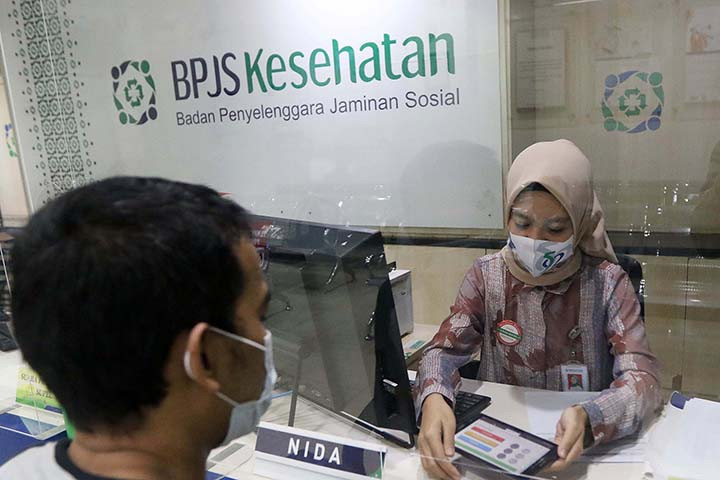Popular Reads
Top Results
Can't find what you're looking for?
View all search resultsPopular Reads
Top Results
Can't find what you're looking for?
View all search resultsFears health bill could undermine BPJS Kesehatan
Observers from several quarters, including the IDI, have objected to certain provisions in the Omnibus Bill on Health, primarily the stipulation that the state-owned insurer be placed under the Health Ministry.
Change text size
Gift Premium Articles
to Anyone
W
atchdogs have expressed concern that the Omnibus Bill on Health could undermine the autonomy and independence of the state-owned Health Care and Social Security Agency (BPJS Kesehatan), as the government aims to bring the national health insurance provider within the purview of the Health Ministry.
The bill stipulates that BPJS Kesehatan reports to the president through the Health Ministry, whereas Law No. 24/2011 on the BPJS states that the agency works directly under the head of state.
The omnibus bill also allows the Health Ministry to monitor the agency’s performance and determine the rates for medical procedures and medications in relation to reimbursement claims.
The draft regulation also requires BPJS Kesehatan to “carry out tasks” assigned by the Health Ministry, to integrate its information system with the centralized system, and to submit its financial reports to the president via the ministry.
The Health Ministry is also authorized to form a team to appoint members to the agency’s board of directors and board of supervisors. This authority currently belongs to the president.
Observers say that allowing the Health Ministry to supervise BPJS Kesehatan is a threat to the state insurer’s independence.
Diah Saminarsih, the founder CEO of the Center for Indonesia’s Strategic Development Initiatives (CISDI), has said the new arrangement will open an even wider opportunity for insurance fraud.
“The Health Ministry operates hundreds of hospitals across the country. If one of them committed fraud, for example, there will be a conflict of interest and BPJS Kesehatan will not be able to easily end its partnership with the hospital,” Diah said last week.
Article 424 of the Omnibus Bill on Health states that BPJS Kesehatan shall consult the Health Minister if the agency wants to terminate its partnership with a hospital suspected of committing violations.
Indra Munaswar from BPJS Watch said that placing BPJS Kesehatan under the Health Ministry was a complete misapprehension of the nature of the insurance operator.
“BPJS Kesehatan’s entire budget comes from premiums paid by policyholders. We cannot treat the agency like a state-owned enterprise funded by the state budget. The agency should never be required to carry out tasks from a ministry, it should remain independent,” Indra told The Jakarta Post on Thursday.
Fixing problems
In the scholarly portion of the bill, lawmakers argue that allowing the Health Ministry to oversee BPJS Kesehatan can pave the way toward improving general funding for improving public health, including healthy lifestyle promotion, disease prevention and early detection.
“Since BPJS Kesehatan only answers to the president, it’s difficult for the Health Ministry to work together with the agency to fund the ministry’s [public health] strategies, such as screenings for 14 common deadly diseases,” the lawmakers wrote.
The omnibus bill has 20 chapters and 478 articles, and it will amend four laws and eliminate nine in a single stroke if it is passed.
The bill has also met with stiff opposition from various camps.
The Indonesian Medical Association (IDI) has decried the lack of public participation in the bill’s formulation, saying that if the bill were passed into law, it would give the government greater power over a number of crucial aspects in the health sector, including how doctors are educated, licensed and distributed amid the perceived shortage of doctors and medical specialists in the country.
The bill is intended to support the Health Ministry’s ongoing efforts to reform national health care, which includes increasing the number of doctors and medical specialists and fixing the various issues that have plagued BPJS Kesehatan, such as low-quality services and revenue loss.
For a large part of its nine-year existence, BPJS Kesehatan has suffered massive losses, recording deficits of Rp 51 trillion (US$3.4 billion) in 2019 and Rp 5.69 trillion in 2020.
The agency’s bleeding budget was plugged only in 2021 after President Joko “Jokowi” Widodo increased the premiums of the National Health Insurance (JKN) program and as an indirect consequence of the pandemic, when people avoided health facilities for fear of contracting COVID-19.
In 2021-2022, the Indonesia Ombudsman received 700 reports from members of the public on poor JKN services, from hospitals refusing to treat JKN policyholders, discharging patients before they had fully recovered and to discrimination in services.
Earlier this month in Subang, West Java, a woman who was 9 months pregnant and her unborn baby died after she was refused care in a government-owned hospital, allegedly due to administrative problems with her JKN policy.
The Omnibus Bill on Health states that BPJS Kesehatan shall pay the insurance claims of JKN policyholders for all treatments necessary for their recovery without restricting the duration of their hospital stays or placing a quota for reimbursements on hospitals.
The bill also eliminates the current three-tiered JKN system that places policyholders into three classes of premiums as a means of ensuring the program’s sustainability as well as guaranteeing equitable services for policyholders.
The government is aiming to achieve universal health coverage by 2030 in line with its health target for the Sustainable Development Goals (SDGs). As of last year, 90.7 percent of all Indonesians, or the equivalent of 248.77 million people, are JKN subscribers.









